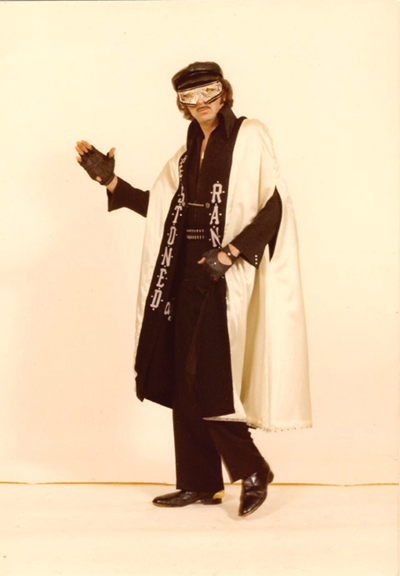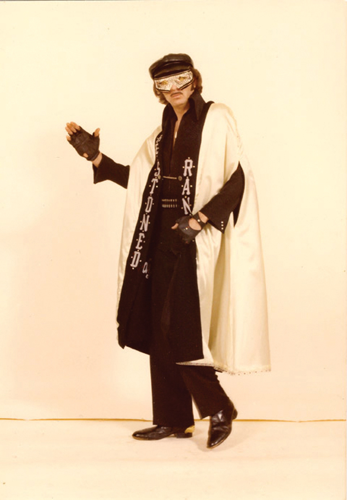Among the more famous guitars in the Country Music Hall of Fame and Museum is a Martin D-35S acoustic. It's a custom model, but the unique features are mainly cosmetic — the torch inlay on the headstock, the distinctive leaf-and-acorn pattern on the fretboard. Otherwise, it looks like any well-made six-string, the scratched-and-scuffed gloss covering its yellow woodgrain still protected by a tortoiseshell pickguard. It was while playing this guitar that Johnny Cash went from country star to American icon. The Martin was one of his regular guitars for most of the '70s, strapped high on his chest as he took over televisions with The Johnny Cash Show, transcending the Music Row machine just as it began to break down.
If history were kinder, the guitar might be remembered for its other frequent player. Chance Martin, a longtime cue-card man, stage manager and close friend to Cash, wrote his first songs on the instrument. He worked for The Johnny Cash Show, and he ended up in charge of the guitar. Cash began letting him take it home on off days, and Martin penned a few songs, which his mentor published. Eventually, Cash gave him the guitar, and Martin held onto it for 14 years before handing it off to the Hall of Fame.
But before he gave it up, Chance used it. From 1977 to 1981, Martin wrote and recorded In Search, a countrydelic odyssey bridging raunchy funk and idyllic pop, outlaw balladry and Technicolor acid tests. It could have been a classic. Instead, it was ignored, existing only in a private press of 1,000 that Martin made but never sold.
"The labels all said, 'I don't know what we're going to do,' " Martin laughs, his easygoing drawl emanating from a phone at the Nashville studio of Cowboy Jack Clement. For about a decade, Martin has worked for the renowned producer — who himself has of course worked with more than a few luminaries, Cash included. And for eight years, Clement and Martin have co-hosted a show on SiriusXM's Outlaw Country station.
"They were just spooked by disco," Martin continues. "I was just a victim, man. I ran head-on into the disco wall. I never sold any of these albums. I gave a few away to my friends. Over the years, they would get across the country somehow, and I've been contacted three times in the last three or four years and have sold these albums for $50 a piece. They buy them and then resell them at vinyl shows or something. At some point, somebody said they were selling them at a vinyl show for $300 a piece, and I said, 'Well, I got more with mold on 'em. You want 'em?' "
For years, In Search has been revered and coveted by the most intense record obsessives, but otherwise ignored. Recently, two hardcore collectors decided to track Martin down — Brendan Greaves and Christopher Smith, who co-own North Carolina record label Paradise of Bachelors. Martin's initial pressing is credited only with cryptic initials, and tracking him down proved trying. When Smith succeeded in getting him on the phone, he was understandably anxious.
"He said, 'I'm so nervous, I can hardly talk to you,' " says Martin. "I said, 'Well, drink a beer and take a Valium, and then call me back.' And I hung up on him."
Among the strengths of the label, which unveils the first reissue of In Search next week, is relating the stories of the artists, both in eloquently written biographies and exhaustive liner notes. In that regard, Martin was a goldmine. He worked for Cash on and off for about eight years, at times staying in his Hendersonville lake house. For a long time, Martin was a stagehand in town, working Nashville's biggest concerts. He's worked in radio, and he's been in movies. He was once driven across London by Mick Jagger. He met Neil Armstrong and brashly boasted that he had blasted off in a recording studio — "And I didn't have to drink any Tang, either."
For In Search, Chance and his band rehearsed at "The Dead End," his name for the bonus-room rehearsal space at his parents' house in South Nashville; the home was on a cul de sac. They drank and got high, entertained famous guests, and took late-night rides on Martin's boat. They recorded exclusively at midnight, leaving in a convoy of people movers and limos.
"No one had really tried to find Chance," Greaves explains. "We didn't know if Chance was a band or a person. We were finally able to track down one of the band members who put us in touch with the man himself. And then the story just kind of unfolded from there in amazing ways and ended up being much richer than anything we could have possibly anticipated."
Luckily, the music lives up to the myth. "High Test" is a swaggering psych-funk morality play in which a dude is handed a newspaper as he boards an airplane. Soon, he's freaking out about the public's ignorance as he knocks back cocktails. Crunchy riffs chase manic saxophone blasts as Martin raves with an unhinged snarl — think Cash in a narcotic rage. "Love by Chance" opens with Bond-theme theatrics, Martin's backup singers cooing confidently over surging guitar solos. By the end, the song has mutated into post-Zeppelin arena rock with Martin's drummer howling as the riffs push higher and higher.
"We wanted to make sure it didn't sound like anybody else," Martin says. "I thought that was the hardest part. It took a long time to really realize that I had accomplished that."
Thirty-two years later, In Search continues to prove him right.
Email music@nashvillescene.com.






